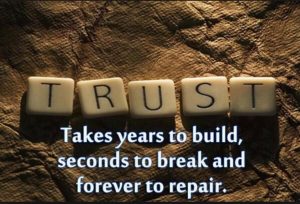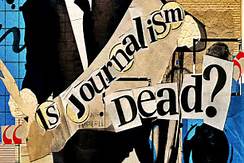Those of us who have been in the news business for more than a few years (for me, it’s more than 30 years) have learned a hard truth in the past decade or so: There has been a palpable shifting of the lines between what we learned journalism ideally should be and what it has become.
Coming as I did as a neophyte into the cavernous newsroom of the Chicago Tribune back in 1969, right out of college, I had editors who made sure that I didn’t stray from accurate, evenhanded, and unbiased reporting into opinion and rumor. When I did, I heard about it from some crabby City Editor.
An even worse sin at the Tribune was the sin of omission. That occurred if you took it upon yourself NOT to report something because doing so might not coincide with YOUR interpretation of the event or your political predilection.
“The only thing worse than writing a story filled with mistakes and lies is to ignore and bury a story because it violates your viewpoints,” a Tribune editor once chided a fellow reporter. “That’s like a doctor withholding life-saving medicine from a patient he may not like.”
That happens all too often in today’s news media. For example, in March 2019, Attorney General Barr told President Trump in the Oval Office that his national emergency declaration was clearly lawful and exactly what Congress intended when it passed the National Emergencies Act, which gave presidents the broad discretionary authority to identify and respond to emergent circumstances like the humanitarian and security crisis at our southern border.
What? You didn’t see it on TV or read it in your newspaper? That’s because the big three networks—ABC, NBC, and CBS—buried the story, preventing millions of viewers from learning about the Justice Department’s legal advice to the President. So did all cable networks, except for FOX.
They preferred to push the anti-Trump narrative that the emergency declaration was somehow unlawful or beyond the parameters of the National Emergency Act—which it clearly was not. But hey, never let the facts get in the way of a hit job on a president the legacy media hate.
Then there is the Joe Biden/Hunter Biden scandal, which the mainstream media decided didn’t warrant any reporting beyond one or two cursory and superficial stories that a couple of news outlets did a few years ago. Never mind that new evidence has surfaced and continues to surface every day.
Now we know that the media, including Big Tech, conspired to ignore any story having to do with Hunter Biden, including his notorious laptop computer, which was loaded with damaging emails and other evidence showing how the Biden family profited from cozy deals with China, etc. The result was that millions of American voters who depended on the networks, newspapers, and some cable outlets for their news during the 2020 presidential campaign never learned of the Hunter Biden laptop or the Biden family’s shameful money-grubbing conflict of interest vis-a-vis China.

Nor did the mainstream media report on how much and how often House Intelligence Committee Chairman Adam Schiff lied about everything from having “proof” of Trump’s collusion with Russia to the President’s phone call with Ukrainian President Volodymyr Zelensky?
Only the Washington Post did so—giving Schiff the maximum of four Pinocchios for his fabrications and deceits concerning the “dreadful” phone call. Kudos to the Post!
When I was learning how to be a reporter, we were exhorted to strive for objectivity in our reporting. Of course, we knew there was no such thing as a purely objective reporter. All of us have biases and are more than likely predisposed to have prejudices one way or another in dealing with events, sources, issues, etc.
What dismays me today is that with the enormous influence of social media and cable news shows that purport to report stories unbiasedly, the viewing public has trouble discerning between news and opinion. The strict separation between news and opinion is simply vanishing. Today, news anchors feel it is their duty and prerogative to sprinkle their opinions throughout every story—especially those dealing with President Trump.
Legendary newsmen I grew up with, such as Walter Cronkite, Chet Huntley, Harry Reasoner, etc., worked assiduously to keep their sentiments out of news stories. Why? Because doing otherwise would have undermined their credibility as professional journalists. And once journalists lose their credibility, they have lost everything. When they did opine, they did so by alerting their viewers that they were about to do so.
I hear journalists today insisting that stories need “interpretation” and that reporters need to adapt to the “realities of 21st Century journalism.”
I beg to differ. The realities of 21st Century journalism should mirror those of 20th Century journalism. Superior journalism needs to be a watchdog on government and elected officials, and it needs to be as objective and impartial as possible. At least that’s the kind of fundamental journalism I taught my students as a journalism professor at the University of Illinois.
There is nothing wrong with explanatory journalism, but there should be no doubt where news ends and opinion begins.
Too many reporters today believe that advocating for some cause or viewpoint is equivalent to interpreting the news. It is not. Journalists are not advocates, and they should never fall into that trap.
Today, “public journalism” has emerged as a raison d’être for biased and subjective reporting.
Public journalism says journalism should not only inform the public, but reporters should actually work toward engaging citizens and create public debate. It abandons the traditional role of journalism in which reporters are observers of the political process and instead makes them active participants. Another name for this is “participatory journalism”–a form of journalism that completely abandons journalistic objectivity in favor of political engagement.
The result? Reporters who are now propagandists and who push whatever political agenda or narrative THEY agree with or support.
One of the first rules I learned after joining the Chicago Tribune was that I could not engage in any local politics–including joining the local school board. While reporters were allowed to belong to political parties, we were not allowed to work for any candidates or express any open support. We were supposed to be independent observers. Otherwise, how could our reporting be trusted?
We weren’t even allowed to go on television to express our opinions about a story or issue if we were reporting or covering it.
Here’s a question for you. Are MSNBC talking heads like Rachel Madow, Joy Reid, Joe Scarborough, Mika Brzezinski, and Kirsten Powers journalists? No, they are not. Perhaps they were at one time, but they have abandoned whatever journalistic principles they may have had to become provocative pundits or commentators. Yet we see them anchoring shows that purport to be “news” shows.
This is prima facie fraud. But they couldn’t care less about journalistic credibility because they are NOT journalists. They don’t pretend to be impartial. Many are committed left-wingers, and they make no apologies about it. They are paid to share their left-wing biases with their like-minded audiences, in much the same way that the Fox Network pays Sean Hannity, Tucker Carlson, or Laura Ingraham to share their conservative opinions with their audiences.
I have never heard Hannity, Carlson, or Ingraham claim to be impartial journalists. They are paid commentators, not reporters. One watches those shows knowing that the emphasis is not on impartiality but opinion.
Yet, Fox News gets slammed again and again for being biased in its news coverage. In fact, Fox’s news coverage is as fair as any of the other cable networks (certainly MSNBC’s or CNN’s).
The challenge for the viewing public is to learn to discern between opinion programs and news shows. That goes for all cable and broadcast networks.
Unfortunately, blurring the lines between news and opinion in the reporting process continues to be a near-impossible task for most viewers and readers.
On the other hand, it may be that the viewing and reading public really doesn’t care if stories are slanted and biased as long as they are slanted and biased in the direction they lean, left or right.
I hope that is not the case. If professional journalists and news organizations can not provide unbiased news that helps a citizenry make informed choices and decisions, then I fear our democracy is on a slippery slope to socialism.
When America’s news media and social media platforms suppress and censor stories that are unfavorable to the ruling elite or the political party they support, they are not only abrogating their responsibility to the public they are supposed to serve, they are intentionally subverting freedom of the press and speech guaranteed by the First Amendment.
When that happens, we are left with this abysmal reality: If Americans no longer have freedom of speech or a free press, we will no longer be free.
Think about that for a moment.





Amen, Brother. I spent four decades in public service (uniform & mufti). In that time, I never supported any organized political party. My loyalty was to the Constitution. Now, I’m sickened by the way the deep-state chooses sides.
Me too!